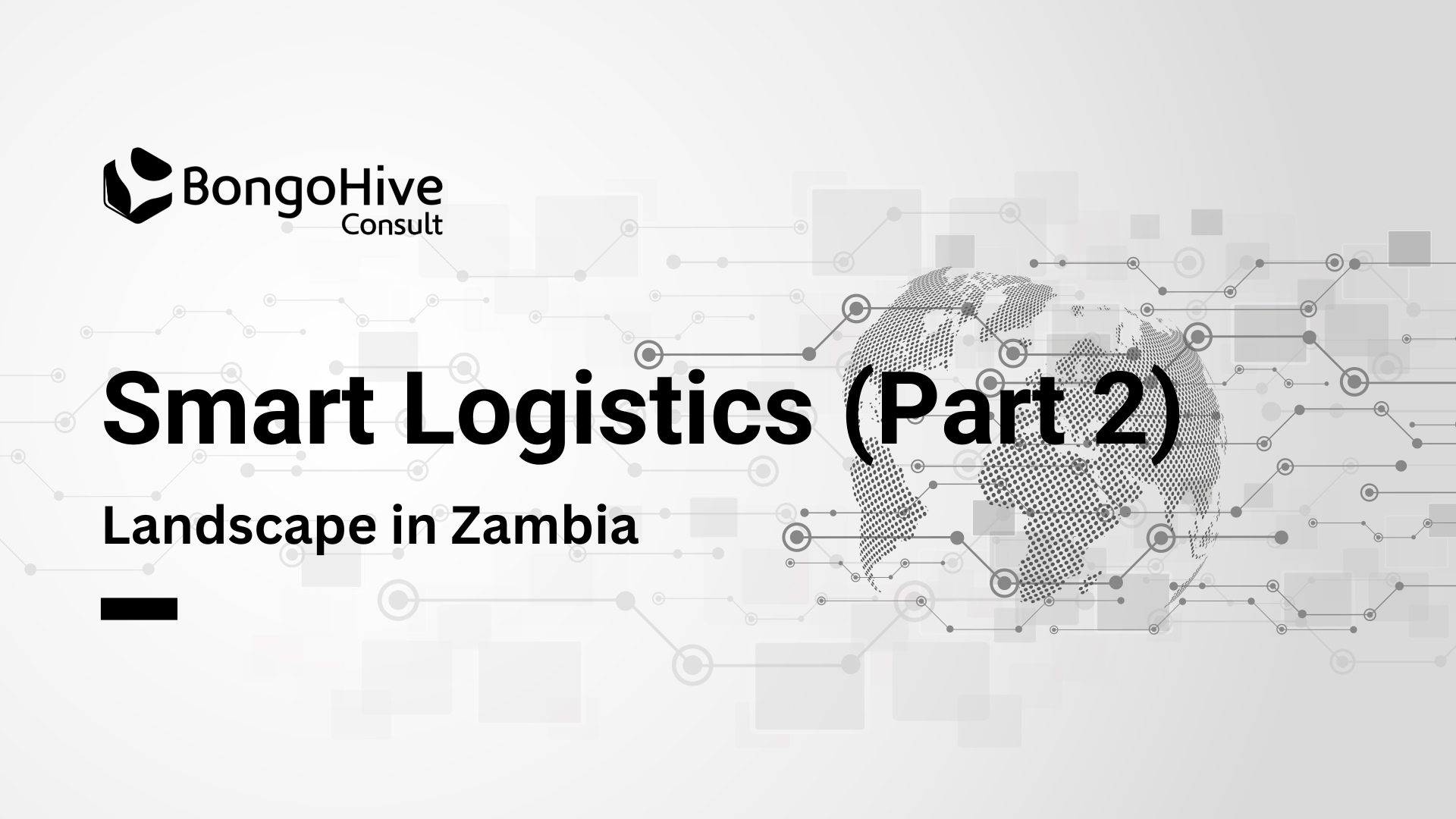
In our last article on smart logistics, we discussed tech in the logistics sector and how utilizing cutting-edge technologies like the Internet of Things (IoT) and artificial intelligence can drastically improve the efficiency of logistics operations. Smart logistics is a crucial part of contemporary businesses that aim to optimize supply chain processes.
In this article, we bring it home to Zambia to explore what innovations and technological innovations are present in our logistics sector.
Even though it is still in its early stages of development, Zambia’s smart logistics sector is essential to the country’s achievement of its “Smart Zambia transformation agenda 2064” and the country’s goal of becoming the center of logistics and transportation by the year 2028.
The Smart Zambia Transformation Agenda 2064 recognizes the importance of smart logistics in driving economic growth and development. According to the agenda, “Smart logistics is a key enabler for efficient and effective transportation of goods and services, which is critical for enhancing trade and economic growth.”
The agenda further states that, “smart logistics systems can improve supply chain efficiency, reduce transportation costs, and enhance customer satisfaction, thereby driving economic growth.”
One of the key factors in the development of smart logistics in Zambia is the use of digital technologies to automate logistical processes. In order to track shipments, manage inventory, optimize routes, and increase the overall effectiveness of logistics operations, there is need for the use of software and other technological tools, thus digitalization is crucial for lowering human error and increasing the accuracy and efficiency of logistics processes.
Businesses like C-Track Zambia use fleet management software that offers a cloud-based, real-time web interface, interactive functionality, and new management reports and dashboard systems. They offer simple scalability for managing any fleet of 1 to 1000 vehicles thus the data processing platform turns operational performance, vehicle utilization, and key result figures based on precise clear data into reality.
Technologies in the logistics sector
Local delivery services like Afridelivery, a Zambian-owned online platform that enables one to have food and goods delivered to various locations is utilizing cutting-edge technologies to better their services.
Cynthia Kabamba, Afridelivery CEO’s Assistant, says the development of technology in the logistics sector has increased productivity by enabling firms such as theirs to automate manual procedures like order management, invoicing, and inventory management. This has helped to reduce errors and increase the speed of operations.
She further adds that The internet of things (IOT )is a game-changer for the industry and has enhanced operations in the following ways:
- Improved visibility: making it simpler for logistics companies to track the movement of goods and give clients up-to-date information on their status, client trus and satisfaction has increased.
- Route optimization: logistics firms can now route more efficiently and spend less on transportation. Logistics firms can find the most cost-effective routes and hence reduce the use of fuel use by using GPS tracking and route optimization software.
- Increased safety: Better tracking and monitoring has been made possible through technology thus increasing safety in the logistics sector. As a result, there are now fewer chances of theft and product damage.
- Increased competition: Technology has made it possible for new players to enter Zambia’s logistics market, boosting competition and spurring innovation.
On the other hand, Zambia experiences a variety of logistical challenges as a result of its location and inadequate infrastructure. However, the use of drones has come to light as a potential remedy to improve Zambia’s logistical environment.
Independent Drone and Service Consultant, Kamangu Samuel Maeti highlights ways in which the use of drones in Zambia has the potential to drive smart logistics in Zambia.
‘’Zambia faces some unique challenges for last mile delivery, such as poor infrastructure, traffic congestion, a lack of address systems, and low internet penetration. However, there are also some opportunities for innovation and improvement.
Unmanned Aerial Vehicles (UAVs) or Drones can increase efficiency in last-mile delivery by reducing energy consumption, pollutant emissions, delivery time, and cost compared to conventional vehicles. Faster Delivery: Drones can travel much faster than traditional ground vehicles, such as vans or trucks, especially in congested areas with heavy traffic. This can significantly reduce the time required to deliver goods at the last mile, resulting in faster and more efficient delivery.’ He explains.
Samuel further lists ways through which the use of drones adds value to the logistics sector:
- Cost-Effectiveness: Using drones for last-mile delivery can be more cost-effective than traditional delivery methods, especially for small packages or urgent deliveries. It eliminates the need for human labor, fuel costs, and vehicle maintenance costs, making it a more affordable option for businesses.
- Improved Delivery Times: Drones can be used to deliver packages to remote or hard-to-reach areas where traditional vehicles cannot access them easily. This can improve delivery times and customer satisfaction, as packages can be delivered quickly and efficiently.
- Enhanced Safety: Drones can help reduce the risk of accidents and injuries associated with traditional delivery methods, such as road accidents or package handling injuries. This can improve the safety of delivery personnel and customers, as well as reduce insurance costs for businesses.
- Real-Time Tracking: Drones can be equipped with GPS and other tracking technologies that provide real-time information on the location and status of packages. This can help businesses and customers track the progress of their deliveries and ensure that they are delivered on time.
The points above are some of the ways in which drones can be used to make processes more effective and efficient in the logistics industry.
Startups in the Logistics Sector in Zambia
As a business and entrepreneur operating in Zambia, what approach can be taken to help facilitate the growth of the smart logistics sector in Zambia?
Startups in Zambia can leverage technological innovation to make logistic solutions functional and efficient with an awareness of the economic and environmental constraints. It is worth noting that for a country like Zambia, last-mile delivery in the logistics sector continues to prove particularly challenging. This is to say, Zambia faces some unique challenges for last-mile delivery, such as poor infrastructure, traffic congestion, lack of address systems, and low internet penetration. However, there are also some opportunities for innovation and improvement.
Some examples of solutions that can make last-mile delivery more efficient in Zambia are:
- Using alternative modes of transportation, such as bicycles, motorcycles, drones, or boats. These can help overcome road conditions, reduce emissions, and increase speed and flexibility.
- Leveraging local networks and partnerships, such as micro-entrepreneurs, community hubs, or postal services. These can help expand coverage, reduce costs, and improve customer service.
- Portable and Stationary solar-powered refrigerators, embedded payments through digital platforms.
- Adopting advanced technologies and autonomous vehicles, such as artificial intelligence (AI), internet of things (IoT), blockchain, or self-driving cars. These can help optimize routes, enhance visibility, increase security, and automate processes.
Despite the challenges faced by the logistics industry in Zambia, smart logistics solutions are providing a much-needed lifeline to businesses and consumers alike. As technology continues to advance and the demand for faster, more efficient delivery grows, it is likely that the smart logistics landscape in Zambia will continue to expand, offering new opportunities for businesses and consumers in the country.
In conclusion, the smart logistics landscape in Zambia is evolving, with the advent of new technologies and innovative solutions such as smart delivery services like Afridelivery. These services are transforming how goods are transported and delivered across the country, improving efficiency, speed, and cost-effectiveness.
With a growing population and increasing demand for goods and services, smart logistics solutions have become critical to ensuring the timely delivery of goods and reducing the costs associated with logistics. By leveraging digital platforms, data analytics, and mobile technologies, smart logistics providers are enhancing visibility, transparency, and control across the supply chain.
Are you looking to integrate technology into your business model or process? Get in touch with us!
We assist in:
- Assessing technology needs and aligning with business objectives.
- Analysing market trends and researching emerging technologies.
- Providing implementation guidance and project management support.
- Ensuring technical and operational compatibility with existing systems.
- Training and upskilling of personnel.
- By leveraging the latest technology, our consultancy tech team helps established businesses to improve efficiency, stay ahead of the competition, and drive innovation.
BongoHive Consult offers expertise and solutions for businesses and corporations looking to incorporate and leverage the use of technology and innovation. Get in touch with us by visiting our website at [email protected] or call +260 97 362 1800
 BongoHive
BongoHive